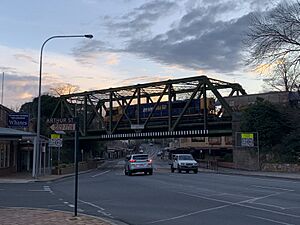Argyle Street railway bridge, Moss Vale facts for kids
Quick facts for kids Argyle Street railway bridge |
|
|---|---|
| Coordinates | 34°33′03″S 150°22′12″E / 34.5507°S 150.3701°E |
| Carries | Main Southern railway |
| Locale | Moss Vale, Wingecarribee Shire, New South Wales, Australia
|
| Owner | RailCorp |
| Characteristics | |
| Design | Pratt truss |
| Material | Steel |
| Total length | 40.54 metres (133.0 ft) |
| Longest span | 40.54 metres (133.0 ft) |
| Number of spans | 1 |
| History | |
| Designer | New South Wales Government Railways |
| Constructed by | New South Wales Government Railways |
| Fabrication by | Dorman Long of Middlesbrough, England |
| Construction end | 1914 |
| Official name: Moss Vale rail underbridge over Argyle Street; Argyle Street railway bridge | |
| Type: | state heritage (built) |
| Designated: | 2 April 1999 |
| Reference #: | 1049 |
| Type: | Railway Bridge/ Viaduct |
| Category: | Transport - Rail |
| Builders: | Steel supplied by Dorman Long, Middlesbrough, England |
The Argyle Street railway bridge is a special old railway bridge in Moss Vale, Australia. It's part of the Main Southern railway line. This bridge was built in 1914 by the New South Wales Government Railways. The steel for it came all the way from England! Today, the bridge is owned by RailCorp, a government group in New South Wales. It was added to the New South Wales State Heritage Register on April 2, 1999, which means it's an important historical site.
Contents
History of the Argyle Street Bridge
Building New Railway Lines
Between 1910 and 1923, the New South Wales Government Railways started a huge project. They wanted to add more railway tracks across the state. This meant building new bridges and updating old ones.
Many new bridges were made from brick arches. But some places needed a different kind of bridge. Argyle Street in Moss Vale was one of those places.
How the Bridge Changed Over Time
When the railway first came through Moss Vale in 1868, there was a simple wooden bridge over Argyle Street. It only had one track.
In 1886, this wooden bridge was replaced with a stronger one made of wrought iron. It still only had one track.
Around 1910, when they planned to add a second track, a brand new bridge was needed. This new bridge would be higher and span completely over Argyle Street.
Modern Bridge Design
By this time, bridge builders in Australia were using American-style designs. They used strong steel structures called "Pratt trusses" for big bridges.
The railway decided to build bridges that could handle much heavier and faster trains in the future. This was a smart idea! It meant they wouldn't have to keep replacing bridges every few years.
For example, the old wrought iron bridge from Moss Vale was moved and used again in Liverpool for a military area. The new policy worked well. The Argyle Street bridge, and many others like it, are still used today by heavy modern trains.
What the Bridge Looks Like
The Argyle Street railway bridge is a large bridge made of steel. It uses a special design called a "Pratt truss". A truss is like a giant metal framework that makes the bridge very strong.
The bridge is about 40.54 meters (133 feet) long. It rests on brick supports called abutments and has brick wing walls on the sides.
In 2006, the bridge was reported to be in very good condition. It still has all its original parts, showing how well it was built!
Why This Bridge is Special
The Argyle Street railway bridge is very important for a few reasons:
- It's a historical landmark: It has been used for over 85 years and is a key part of the historic Main South Railway.
- It's a town feature: The bridge is a noticeable and important part of the Moss Vale town.
- It helped the community: The Main South Railway has brought many benefits to towns in New South Wales for over 130 years. This bridge helped make that possible.
- It's a great example of engineering: The bridge shows off a new type of strong, heavy-duty steel design from its time. Its angled (skew) design is also quite rare for such a large bridge, making it even more special.
This bridge is a fantastic example of a strong steel Pratt truss bridge that still looks much like it did when it was first built.
 | Claudette Colvin |
 | Myrlie Evers-Williams |
 | Alberta Odell Jones |


